Developing Entrepreneurial Skills: Analysis of UK Business Ventures
VerifiedAdded on 2023/06/13
|12
|2731
|489
Report
AI Summary
This report discusses entrepreneurial skills within the context of UK business ventures, exploring various types of ventures, their similarities, and differences. It critically investigates the roles of small, medium, and large businesses in the UK economy, highlighting the impact of small-level businesses on ...
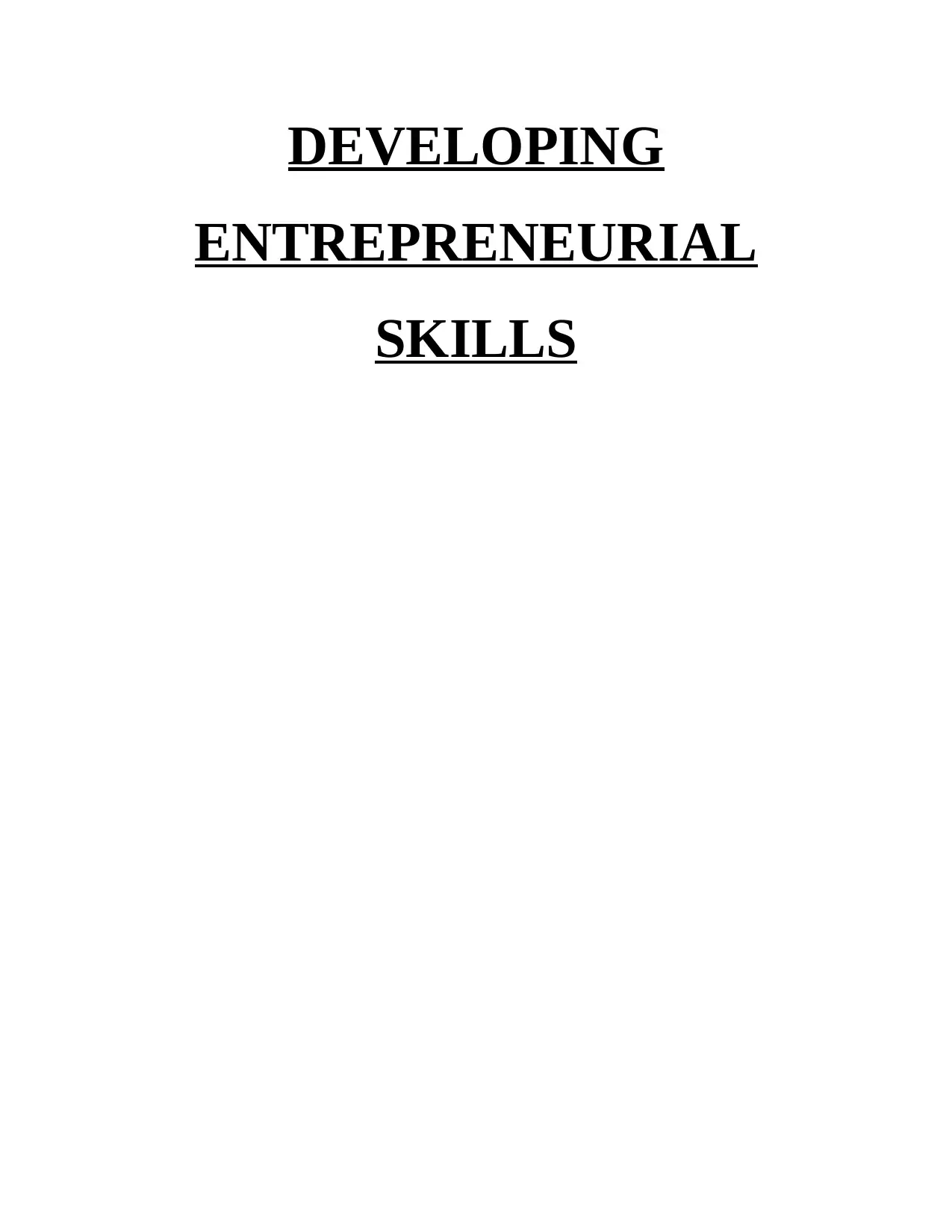
DEVELOPING
ENTREPRENEURIAL
SKILLS
ENTREPRENEURIAL
SKILLS
Paraphrase This Document
Need a fresh take? Get an instant paraphrase of this document with our AI Paraphraser
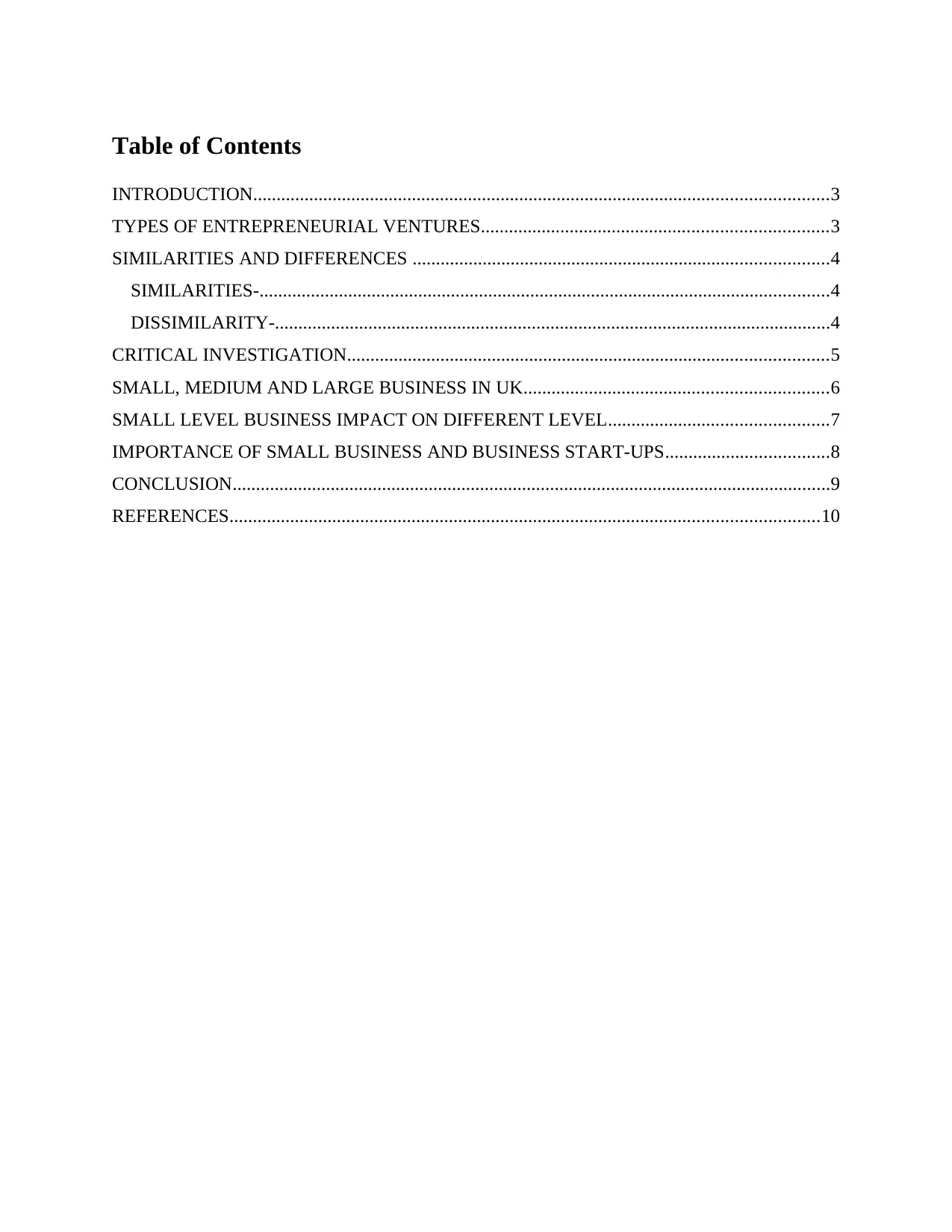
Table of Contents
INTRODUCTION...........................................................................................................................3
TYPES OF ENTREPRENEURIAL VENTURES..........................................................................3
SIMILARITIES AND DIFFERENCES .........................................................................................4
SIMILARITIES-..........................................................................................................................4
DISSIMILARITY-.......................................................................................................................4
CRITICAL INVESTIGATION.......................................................................................................5
SMALL, MEDIUM AND LARGE BUSINESS IN UK.................................................................6
SMALL LEVEL BUSINESS IMPACT ON DIFFERENT LEVEL...............................................7
IMPORTANCE OF SMALL BUSINESS AND BUSINESS START-UPS...................................8
CONCLUSION................................................................................................................................9
REFERENCES..............................................................................................................................10
INTRODUCTION...........................................................................................................................3
TYPES OF ENTREPRENEURIAL VENTURES..........................................................................3
SIMILARITIES AND DIFFERENCES .........................................................................................4
SIMILARITIES-..........................................................................................................................4
DISSIMILARITY-.......................................................................................................................4
CRITICAL INVESTIGATION.......................................................................................................5
SMALL, MEDIUM AND LARGE BUSINESS IN UK.................................................................6
SMALL LEVEL BUSINESS IMPACT ON DIFFERENT LEVEL...............................................7
IMPORTANCE OF SMALL BUSINESS AND BUSINESS START-UPS...................................8
CONCLUSION................................................................................................................................9
REFERENCES..............................................................................................................................10
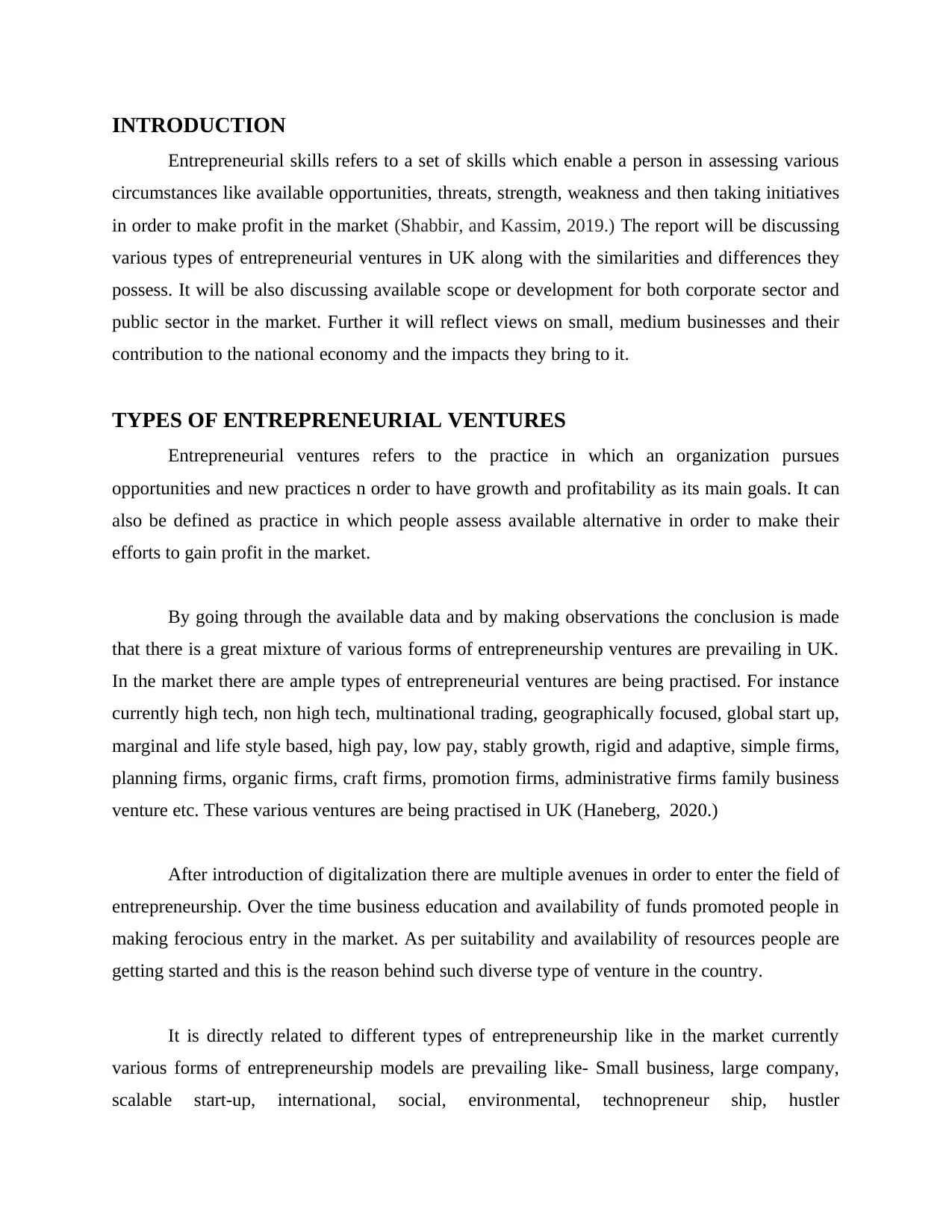
INTRODUCTION
Entrepreneurial skills refers to a set of skills which enable a person in assessing various
circumstances like available opportunities, threats, strength, weakness and then taking initiatives
in order to make profit in the market (Shabbir, and Kassim, 2019.) The report will be discussing
various types of entrepreneurial ventures in UK along with the similarities and differences they
possess. It will be also discussing available scope or development for both corporate sector and
public sector in the market. Further it will reflect views on small, medium businesses and their
contribution to the national economy and the impacts they bring to it.
TYPES OF ENTREPRENEURIAL VENTURES
Entrepreneurial ventures refers to the practice in which an organization pursues
opportunities and new practices n order to have growth and profitability as its main goals. It can
also be defined as practice in which people assess available alternative in order to make their
efforts to gain profit in the market.
By going through the available data and by making observations the conclusion is made
that there is a great mixture of various forms of entrepreneurship ventures are prevailing in UK.
In the market there are ample types of entrepreneurial ventures are being practised. For instance
currently high tech, non high tech, multinational trading, geographically focused, global start up,
marginal and life style based, high pay, low pay, stably growth, rigid and adaptive, simple firms,
planning firms, organic firms, craft firms, promotion firms, administrative firms family business
venture etc. These various ventures are being practised in UK (Haneberg, 2020.)
After introduction of digitalization there are multiple avenues in order to enter the field of
entrepreneurship. Over the time business education and availability of funds promoted people in
making ferocious entry in the market. As per suitability and availability of resources people are
getting started and this is the reason behind such diverse type of venture in the country.
It is directly related to different types of entrepreneurship like in the market currently
various forms of entrepreneurship models are prevailing like- Small business, large company,
scalable start-up, international, social, environmental, technopreneur ship, hustler
Entrepreneurial skills refers to a set of skills which enable a person in assessing various
circumstances like available opportunities, threats, strength, weakness and then taking initiatives
in order to make profit in the market (Shabbir, and Kassim, 2019.) The report will be discussing
various types of entrepreneurial ventures in UK along with the similarities and differences they
possess. It will be also discussing available scope or development for both corporate sector and
public sector in the market. Further it will reflect views on small, medium businesses and their
contribution to the national economy and the impacts they bring to it.
TYPES OF ENTREPRENEURIAL VENTURES
Entrepreneurial ventures refers to the practice in which an organization pursues
opportunities and new practices n order to have growth and profitability as its main goals. It can
also be defined as practice in which people assess available alternative in order to make their
efforts to gain profit in the market.
By going through the available data and by making observations the conclusion is made
that there is a great mixture of various forms of entrepreneurship ventures are prevailing in UK.
In the market there are ample types of entrepreneurial ventures are being practised. For instance
currently high tech, non high tech, multinational trading, geographically focused, global start up,
marginal and life style based, high pay, low pay, stably growth, rigid and adaptive, simple firms,
planning firms, organic firms, craft firms, promotion firms, administrative firms family business
venture etc. These various ventures are being practised in UK (Haneberg, 2020.)
After introduction of digitalization there are multiple avenues in order to enter the field of
entrepreneurship. Over the time business education and availability of funds promoted people in
making ferocious entry in the market. As per suitability and availability of resources people are
getting started and this is the reason behind such diverse type of venture in the country.
It is directly related to different types of entrepreneurship like in the market currently
various forms of entrepreneurship models are prevailing like- Small business, large company,
scalable start-up, international, social, environmental, technopreneur ship, hustler
⊘ This is a preview!⊘
Do you want full access?
Subscribe today to unlock all pages.

Trusted by 1+ million students worldwide
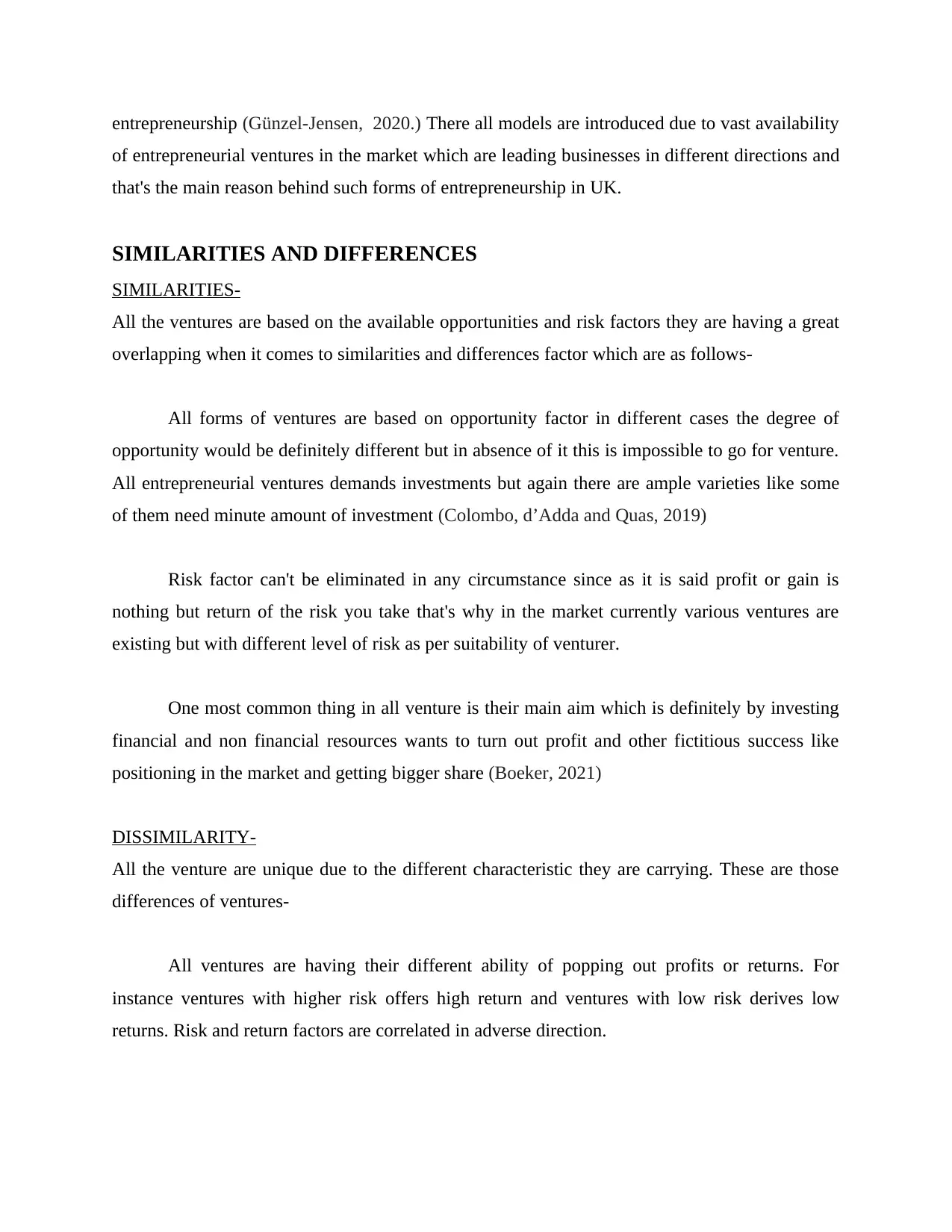
entrepreneurship (Günzel-Jensen, 2020.) There all models are introduced due to vast availability
of entrepreneurial ventures in the market which are leading businesses in different directions and
that's the main reason behind such forms of entrepreneurship in UK.
SIMILARITIES AND DIFFERENCES
SIMILARITIES-
All the ventures are based on the available opportunities and risk factors they are having a great
overlapping when it comes to similarities and differences factor which are as follows-
All forms of ventures are based on opportunity factor in different cases the degree of
opportunity would be definitely different but in absence of it this is impossible to go for venture.
All entrepreneurial ventures demands investments but again there are ample varieties like some
of them need minute amount of investment (Colombo, d’Adda and Quas, 2019)
Risk factor can't be eliminated in any circumstance since as it is said profit or gain is
nothing but return of the risk you take that's why in the market currently various ventures are
existing but with different level of risk as per suitability of venturer.
One most common thing in all venture is their main aim which is definitely by investing
financial and non financial resources wants to turn out profit and other fictitious success like
positioning in the market and getting bigger share (Boeker, 2021)
DISSIMILARITY-
All the venture are unique due to the different characteristic they are carrying. These are those
differences of ventures-
All ventures are having their different ability of popping out profits or returns. For
instance ventures with higher risk offers high return and ventures with low risk derives low
returns. Risk and return factors are correlated in adverse direction.
of entrepreneurial ventures in the market which are leading businesses in different directions and
that's the main reason behind such forms of entrepreneurship in UK.
SIMILARITIES AND DIFFERENCES
SIMILARITIES-
All the ventures are based on the available opportunities and risk factors they are having a great
overlapping when it comes to similarities and differences factor which are as follows-
All forms of ventures are based on opportunity factor in different cases the degree of
opportunity would be definitely different but in absence of it this is impossible to go for venture.
All entrepreneurial ventures demands investments but again there are ample varieties like some
of them need minute amount of investment (Colombo, d’Adda and Quas, 2019)
Risk factor can't be eliminated in any circumstance since as it is said profit or gain is
nothing but return of the risk you take that's why in the market currently various ventures are
existing but with different level of risk as per suitability of venturer.
One most common thing in all venture is their main aim which is definitely by investing
financial and non financial resources wants to turn out profit and other fictitious success like
positioning in the market and getting bigger share (Boeker, 2021)
DISSIMILARITY-
All the venture are unique due to the different characteristic they are carrying. These are those
differences of ventures-
All ventures are having their different ability of popping out profits or returns. For
instance ventures with higher risk offers high return and ventures with low risk derives low
returns. Risk and return factors are correlated in adverse direction.
Paraphrase This Document
Need a fresh take? Get an instant paraphrase of this document with our AI Paraphraser
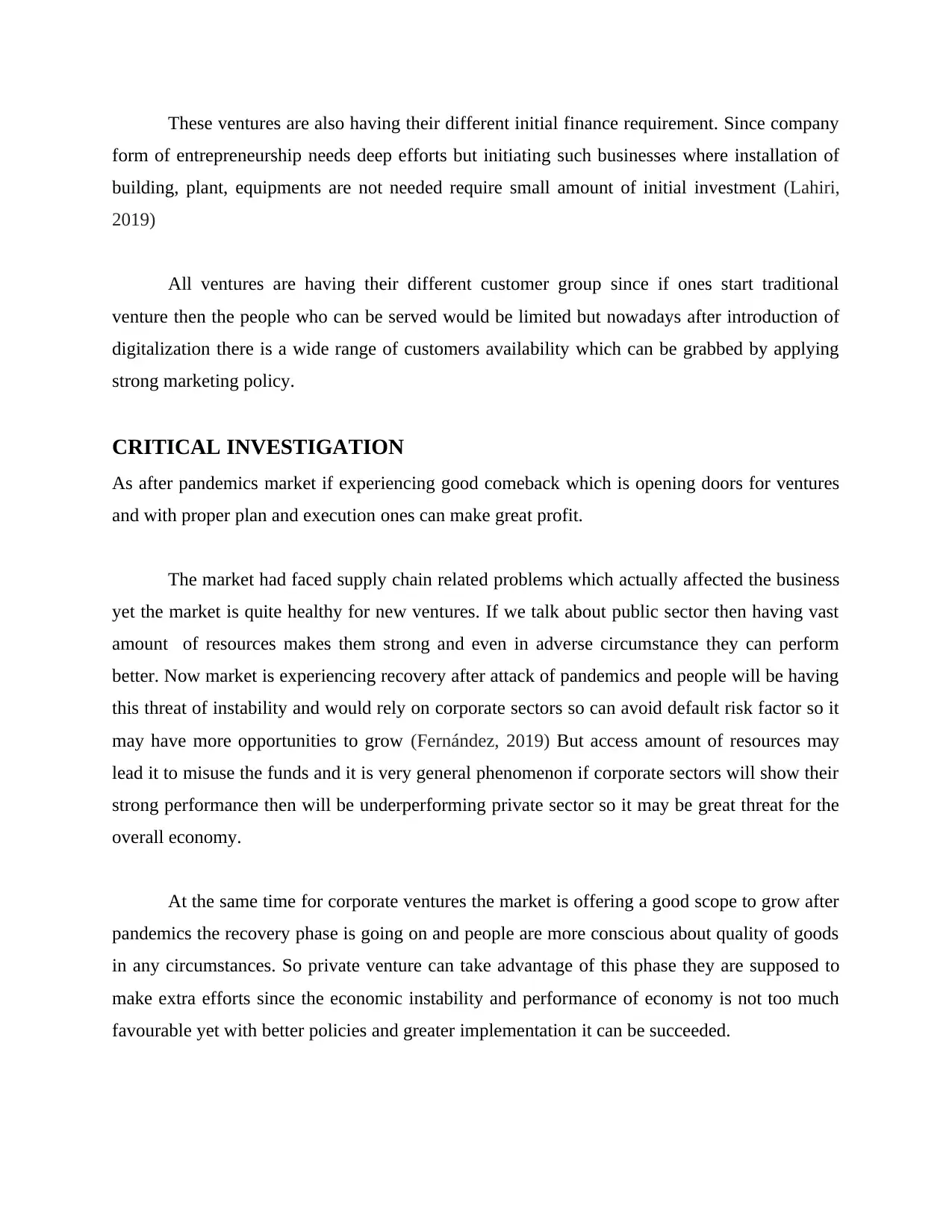
These ventures are also having their different initial finance requirement. Since company
form of entrepreneurship needs deep efforts but initiating such businesses where installation of
building, plant, equipments are not needed require small amount of initial investment (Lahiri,
2019)
All ventures are having their different customer group since if ones start traditional
venture then the people who can be served would be limited but nowadays after introduction of
digitalization there is a wide range of customers availability which can be grabbed by applying
strong marketing policy.
CRITICAL INVESTIGATION
As after pandemics market if experiencing good comeback which is opening doors for ventures
and with proper plan and execution ones can make great profit.
The market had faced supply chain related problems which actually affected the business
yet the market is quite healthy for new ventures. If we talk about public sector then having vast
amount of resources makes them strong and even in adverse circumstance they can perform
better. Now market is experiencing recovery after attack of pandemics and people will be having
this threat of instability and would rely on corporate sectors so can avoid default risk factor so it
may have more opportunities to grow (Fernández, 2019) But access amount of resources may
lead it to misuse the funds and it is very general phenomenon if corporate sectors will show their
strong performance then will be underperforming private sector so it may be great threat for the
overall economy.
At the same time for corporate ventures the market is offering a good scope to grow after
pandemics the recovery phase is going on and people are more conscious about quality of goods
in any circumstances. So private venture can take advantage of this phase they are supposed to
make extra efforts since the economic instability and performance of economy is not too much
favourable yet with better policies and greater implementation it can be succeeded.
form of entrepreneurship needs deep efforts but initiating such businesses where installation of
building, plant, equipments are not needed require small amount of initial investment (Lahiri,
2019)
All ventures are having their different customer group since if ones start traditional
venture then the people who can be served would be limited but nowadays after introduction of
digitalization there is a wide range of customers availability which can be grabbed by applying
strong marketing policy.
CRITICAL INVESTIGATION
As after pandemics market if experiencing good comeback which is opening doors for ventures
and with proper plan and execution ones can make great profit.
The market had faced supply chain related problems which actually affected the business
yet the market is quite healthy for new ventures. If we talk about public sector then having vast
amount of resources makes them strong and even in adverse circumstance they can perform
better. Now market is experiencing recovery after attack of pandemics and people will be having
this threat of instability and would rely on corporate sectors so can avoid default risk factor so it
may have more opportunities to grow (Fernández, 2019) But access amount of resources may
lead it to misuse the funds and it is very general phenomenon if corporate sectors will show their
strong performance then will be underperforming private sector so it may be great threat for the
overall economy.
At the same time for corporate ventures the market is offering a good scope to grow after
pandemics the recovery phase is going on and people are more conscious about quality of goods
in any circumstances. So private venture can take advantage of this phase they are supposed to
make extra efforts since the economic instability and performance of economy is not too much
favourable yet with better policies and greater implementation it can be succeeded.
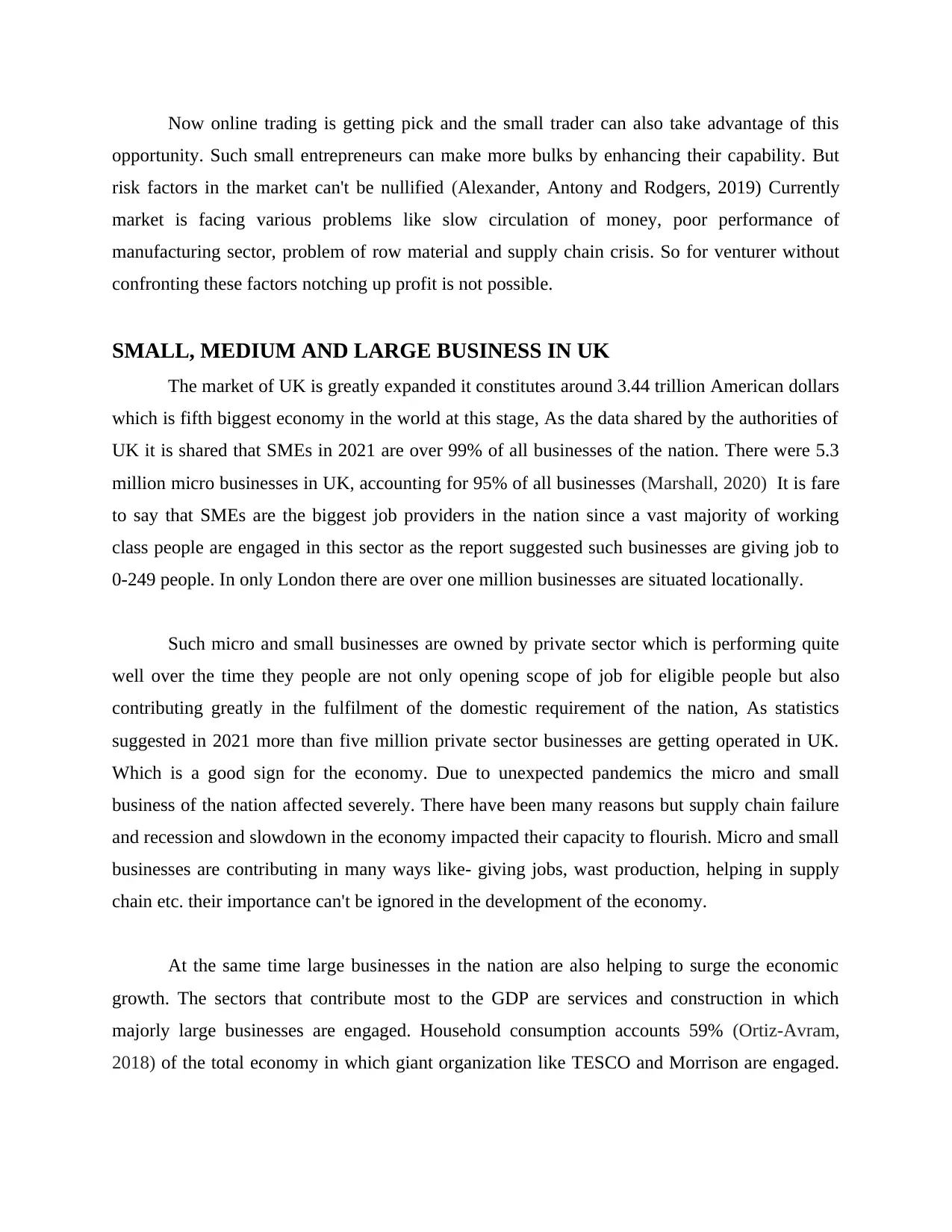
Now online trading is getting pick and the small trader can also take advantage of this
opportunity. Such small entrepreneurs can make more bulks by enhancing their capability. But
risk factors in the market can't be nullified (Alexander, Antony and Rodgers, 2019) Currently
market is facing various problems like slow circulation of money, poor performance of
manufacturing sector, problem of row material and supply chain crisis. So for venturer without
confronting these factors notching up profit is not possible.
SMALL, MEDIUM AND LARGE BUSINESS IN UK
The market of UK is greatly expanded it constitutes around 3.44 trillion American dollars
which is fifth biggest economy in the world at this stage, As the data shared by the authorities of
UK it is shared that SMEs in 2021 are over 99% of all businesses of the nation. There were 5.3
million micro businesses in UK, accounting for 95% of all businesses (Marshall, 2020) It is fare
to say that SMEs are the biggest job providers in the nation since a vast majority of working
class people are engaged in this sector as the report suggested such businesses are giving job to
0-249 people. In only London there are over one million businesses are situated locationally.
Such micro and small businesses are owned by private sector which is performing quite
well over the time they people are not only opening scope of job for eligible people but also
contributing greatly in the fulfilment of the domestic requirement of the nation, As statistics
suggested in 2021 more than five million private sector businesses are getting operated in UK.
Which is a good sign for the economy. Due to unexpected pandemics the micro and small
business of the nation affected severely. There have been many reasons but supply chain failure
and recession and slowdown in the economy impacted their capacity to flourish. Micro and small
businesses are contributing in many ways like- giving jobs, wast production, helping in supply
chain etc. their importance can't be ignored in the development of the economy.
At the same time large businesses in the nation are also helping to surge the economic
growth. The sectors that contribute most to the GDP are services and construction in which
majorly large businesses are engaged. Household consumption accounts 59% (Ortiz-Avram,
2018) of the total economy in which giant organization like TESCO and Morrison are engaged.
opportunity. Such small entrepreneurs can make more bulks by enhancing their capability. But
risk factors in the market can't be nullified (Alexander, Antony and Rodgers, 2019) Currently
market is facing various problems like slow circulation of money, poor performance of
manufacturing sector, problem of row material and supply chain crisis. So for venturer without
confronting these factors notching up profit is not possible.
SMALL, MEDIUM AND LARGE BUSINESS IN UK
The market of UK is greatly expanded it constitutes around 3.44 trillion American dollars
which is fifth biggest economy in the world at this stage, As the data shared by the authorities of
UK it is shared that SMEs in 2021 are over 99% of all businesses of the nation. There were 5.3
million micro businesses in UK, accounting for 95% of all businesses (Marshall, 2020) It is fare
to say that SMEs are the biggest job providers in the nation since a vast majority of working
class people are engaged in this sector as the report suggested such businesses are giving job to
0-249 people. In only London there are over one million businesses are situated locationally.
Such micro and small businesses are owned by private sector which is performing quite
well over the time they people are not only opening scope of job for eligible people but also
contributing greatly in the fulfilment of the domestic requirement of the nation, As statistics
suggested in 2021 more than five million private sector businesses are getting operated in UK.
Which is a good sign for the economy. Due to unexpected pandemics the micro and small
business of the nation affected severely. There have been many reasons but supply chain failure
and recession and slowdown in the economy impacted their capacity to flourish. Micro and small
businesses are contributing in many ways like- giving jobs, wast production, helping in supply
chain etc. their importance can't be ignored in the development of the economy.
At the same time large businesses in the nation are also helping to surge the economic
growth. The sectors that contribute most to the GDP are services and construction in which
majorly large businesses are engaged. Household consumption accounts 59% (Ortiz-Avram,
2018) of the total economy in which giant organization like TESCO and Morrison are engaged.
⊘ This is a preview!⊘
Do you want full access?
Subscribe today to unlock all pages.

Trusted by 1+ million students worldwide
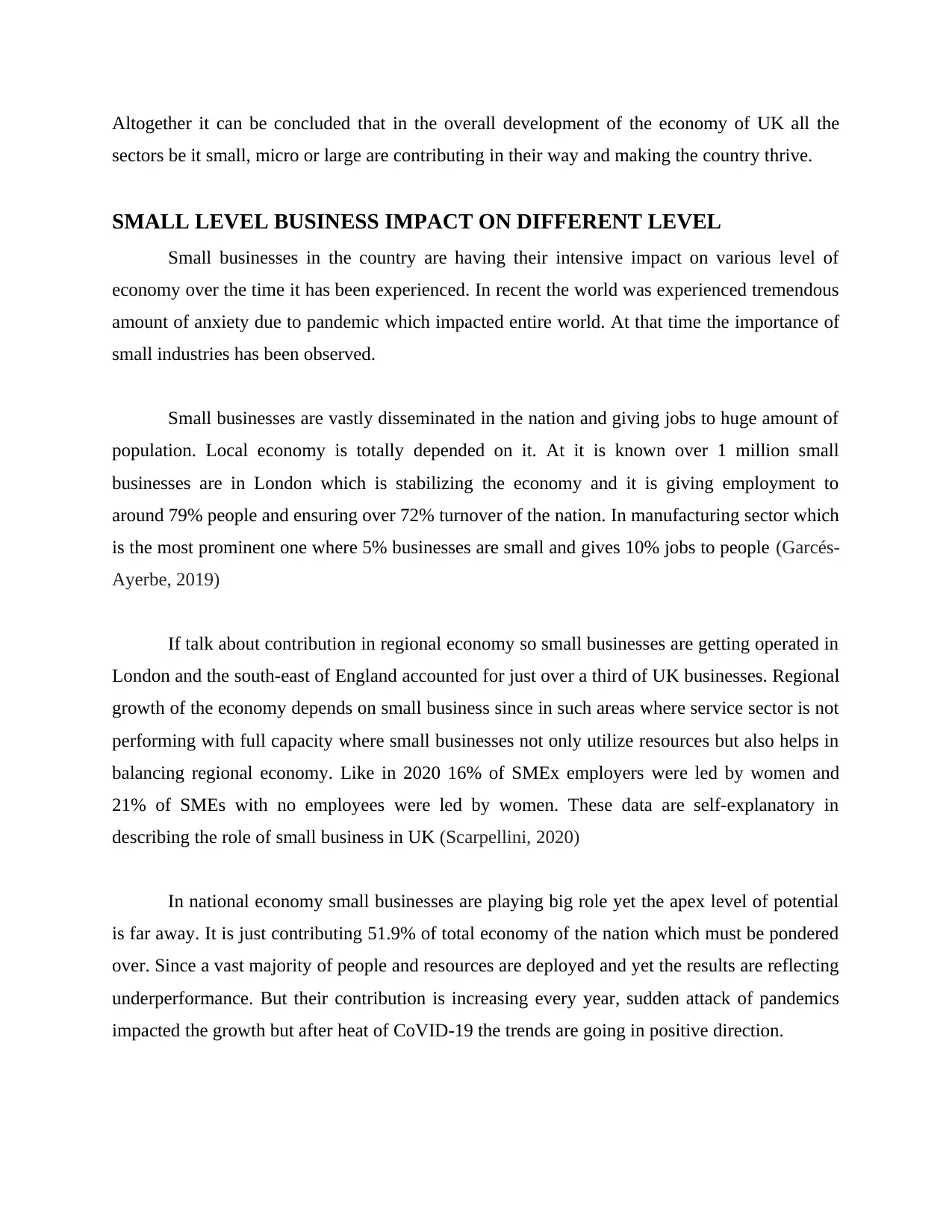
Altogether it can be concluded that in the overall development of the economy of UK all the
sectors be it small, micro or large are contributing in their way and making the country thrive.
SMALL LEVEL BUSINESS IMPACT ON DIFFERENT LEVEL
Small businesses in the country are having their intensive impact on various level of
economy over the time it has been experienced. In recent the world was experienced tremendous
amount of anxiety due to pandemic which impacted entire world. At that time the importance of
small industries has been observed.
Small businesses are vastly disseminated in the nation and giving jobs to huge amount of
population. Local economy is totally depended on it. At it is known over 1 million small
businesses are in London which is stabilizing the economy and it is giving employment to
around 79% people and ensuring over 72% turnover of the nation. In manufacturing sector which
is the most prominent one where 5% businesses are small and gives 10% jobs to people (Garcés-
Ayerbe, 2019)
If talk about contribution in regional economy so small businesses are getting operated in
London and the south-east of England accounted for just over a third of UK businesses. Regional
growth of the economy depends on small business since in such areas where service sector is not
performing with full capacity where small businesses not only utilize resources but also helps in
balancing regional economy. Like in 2020 16% of SMEx employers were led by women and
21% of SMEs with no employees were led by women. These data are self-explanatory in
describing the role of small business in UK (Scarpellini, 2020)
In national economy small businesses are playing big role yet the apex level of potential
is far away. It is just contributing 51.9% of total economy of the nation which must be pondered
over. Since a vast majority of people and resources are deployed and yet the results are reflecting
underperformance. But their contribution is increasing every year, sudden attack of pandemics
impacted the growth but after heat of CoVID-19 the trends are going in positive direction.
sectors be it small, micro or large are contributing in their way and making the country thrive.
SMALL LEVEL BUSINESS IMPACT ON DIFFERENT LEVEL
Small businesses in the country are having their intensive impact on various level of
economy over the time it has been experienced. In recent the world was experienced tremendous
amount of anxiety due to pandemic which impacted entire world. At that time the importance of
small industries has been observed.
Small businesses are vastly disseminated in the nation and giving jobs to huge amount of
population. Local economy is totally depended on it. At it is known over 1 million small
businesses are in London which is stabilizing the economy and it is giving employment to
around 79% people and ensuring over 72% turnover of the nation. In manufacturing sector which
is the most prominent one where 5% businesses are small and gives 10% jobs to people (Garcés-
Ayerbe, 2019)
If talk about contribution in regional economy so small businesses are getting operated in
London and the south-east of England accounted for just over a third of UK businesses. Regional
growth of the economy depends on small business since in such areas where service sector is not
performing with full capacity where small businesses not only utilize resources but also helps in
balancing regional economy. Like in 2020 16% of SMEx employers were led by women and
21% of SMEs with no employees were led by women. These data are self-explanatory in
describing the role of small business in UK (Scarpellini, 2020)
In national economy small businesses are playing big role yet the apex level of potential
is far away. It is just contributing 51.9% of total economy of the nation which must be pondered
over. Since a vast majority of people and resources are deployed and yet the results are reflecting
underperformance. But their contribution is increasing every year, sudden attack of pandemics
impacted the growth but after heat of CoVID-19 the trends are going in positive direction.
Paraphrase This Document
Need a fresh take? Get an instant paraphrase of this document with our AI Paraphraser
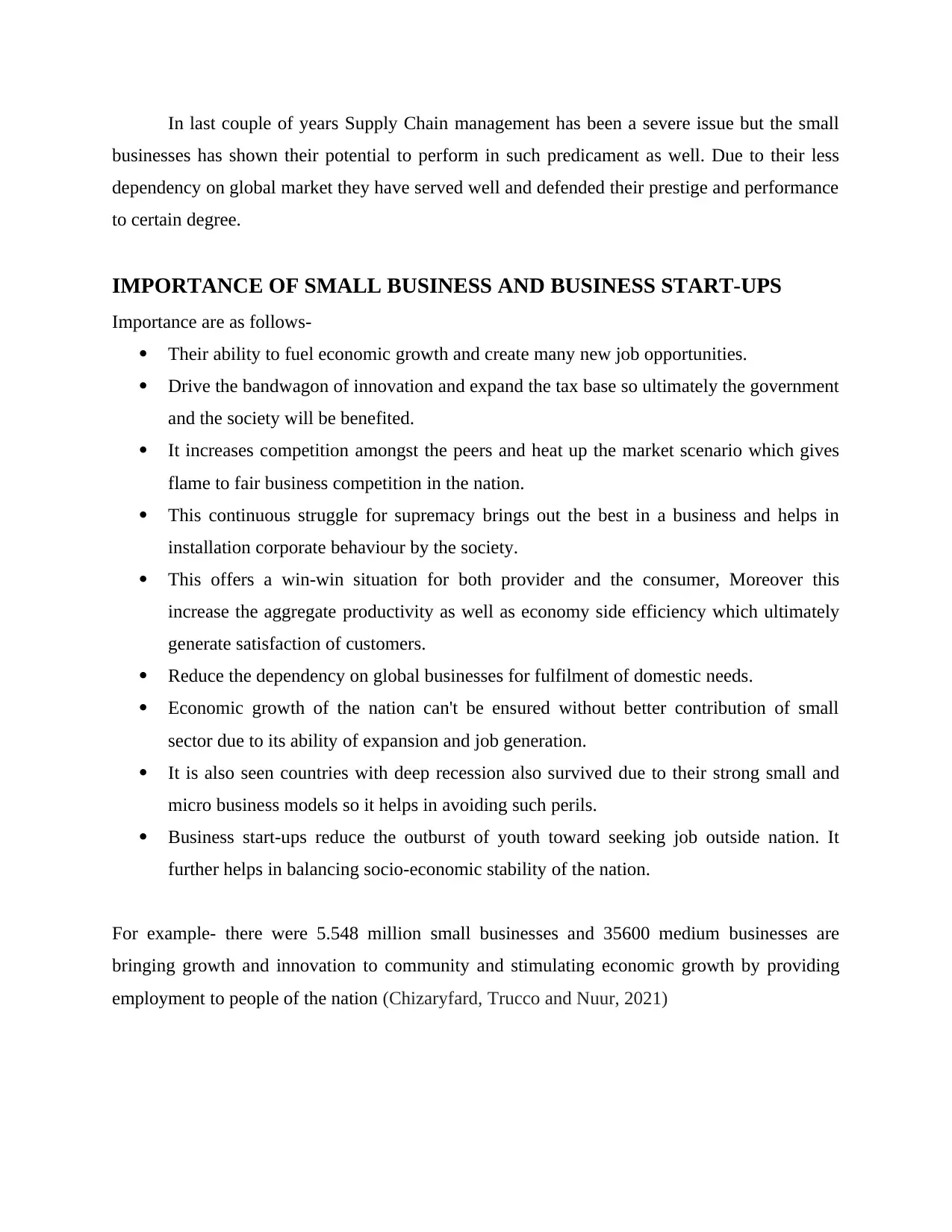
In last couple of years Supply Chain management has been a severe issue but the small
businesses has shown their potential to perform in such predicament as well. Due to their less
dependency on global market they have served well and defended their prestige and performance
to certain degree.
IMPORTANCE OF SMALL BUSINESS AND BUSINESS START-UPS
Importance are as follows-
Their ability to fuel economic growth and create many new job opportunities.
Drive the bandwagon of innovation and expand the tax base so ultimately the government
and the society will be benefited.
It increases competition amongst the peers and heat up the market scenario which gives
flame to fair business competition in the nation.
This continuous struggle for supremacy brings out the best in a business and helps in
installation corporate behaviour by the society.
This offers a win-win situation for both provider and the consumer, Moreover this
increase the aggregate productivity as well as economy side efficiency which ultimately
generate satisfaction of customers.
Reduce the dependency on global businesses for fulfilment of domestic needs.
Economic growth of the nation can't be ensured without better contribution of small
sector due to its ability of expansion and job generation.
It is also seen countries with deep recession also survived due to their strong small and
micro business models so it helps in avoiding such perils.
Business start-ups reduce the outburst of youth toward seeking job outside nation. It
further helps in balancing socio-economic stability of the nation.
For example- there were 5.548 million small businesses and 35600 medium businesses are
bringing growth and innovation to community and stimulating economic growth by providing
employment to people of the nation (Chizaryfard, Trucco and Nuur, 2021)
businesses has shown their potential to perform in such predicament as well. Due to their less
dependency on global market they have served well and defended their prestige and performance
to certain degree.
IMPORTANCE OF SMALL BUSINESS AND BUSINESS START-UPS
Importance are as follows-
Their ability to fuel economic growth and create many new job opportunities.
Drive the bandwagon of innovation and expand the tax base so ultimately the government
and the society will be benefited.
It increases competition amongst the peers and heat up the market scenario which gives
flame to fair business competition in the nation.
This continuous struggle for supremacy brings out the best in a business and helps in
installation corporate behaviour by the society.
This offers a win-win situation for both provider and the consumer, Moreover this
increase the aggregate productivity as well as economy side efficiency which ultimately
generate satisfaction of customers.
Reduce the dependency on global businesses for fulfilment of domestic needs.
Economic growth of the nation can't be ensured without better contribution of small
sector due to its ability of expansion and job generation.
It is also seen countries with deep recession also survived due to their strong small and
micro business models so it helps in avoiding such perils.
Business start-ups reduce the outburst of youth toward seeking job outside nation. It
further helps in balancing socio-economic stability of the nation.
For example- there were 5.548 million small businesses and 35600 medium businesses are
bringing growth and innovation to community and stimulating economic growth by providing
employment to people of the nation (Chizaryfard, Trucco and Nuur, 2021)
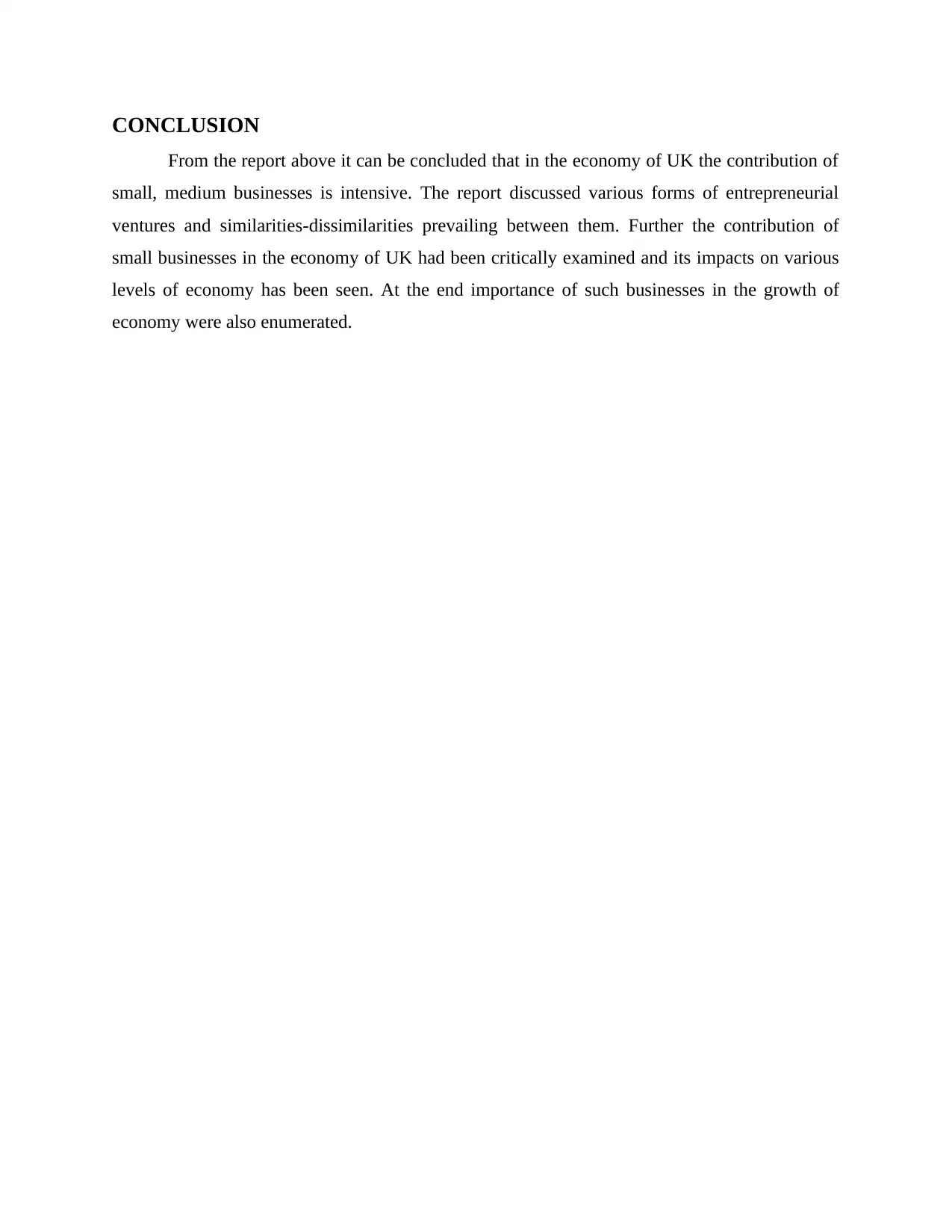
CONCLUSION
From the report above it can be concluded that in the economy of UK the contribution of
small, medium businesses is intensive. The report discussed various forms of entrepreneurial
ventures and similarities-dissimilarities prevailing between them. Further the contribution of
small businesses in the economy of UK had been critically examined and its impacts on various
levels of economy has been seen. At the end importance of such businesses in the growth of
economy were also enumerated.
From the report above it can be concluded that in the economy of UK the contribution of
small, medium businesses is intensive. The report discussed various forms of entrepreneurial
ventures and similarities-dissimilarities prevailing between them. Further the contribution of
small businesses in the economy of UK had been critically examined and its impacts on various
levels of economy has been seen. At the end importance of such businesses in the growth of
economy were also enumerated.
⊘ This is a preview!⊘
Do you want full access?
Subscribe today to unlock all pages.

Trusted by 1+ million students worldwide
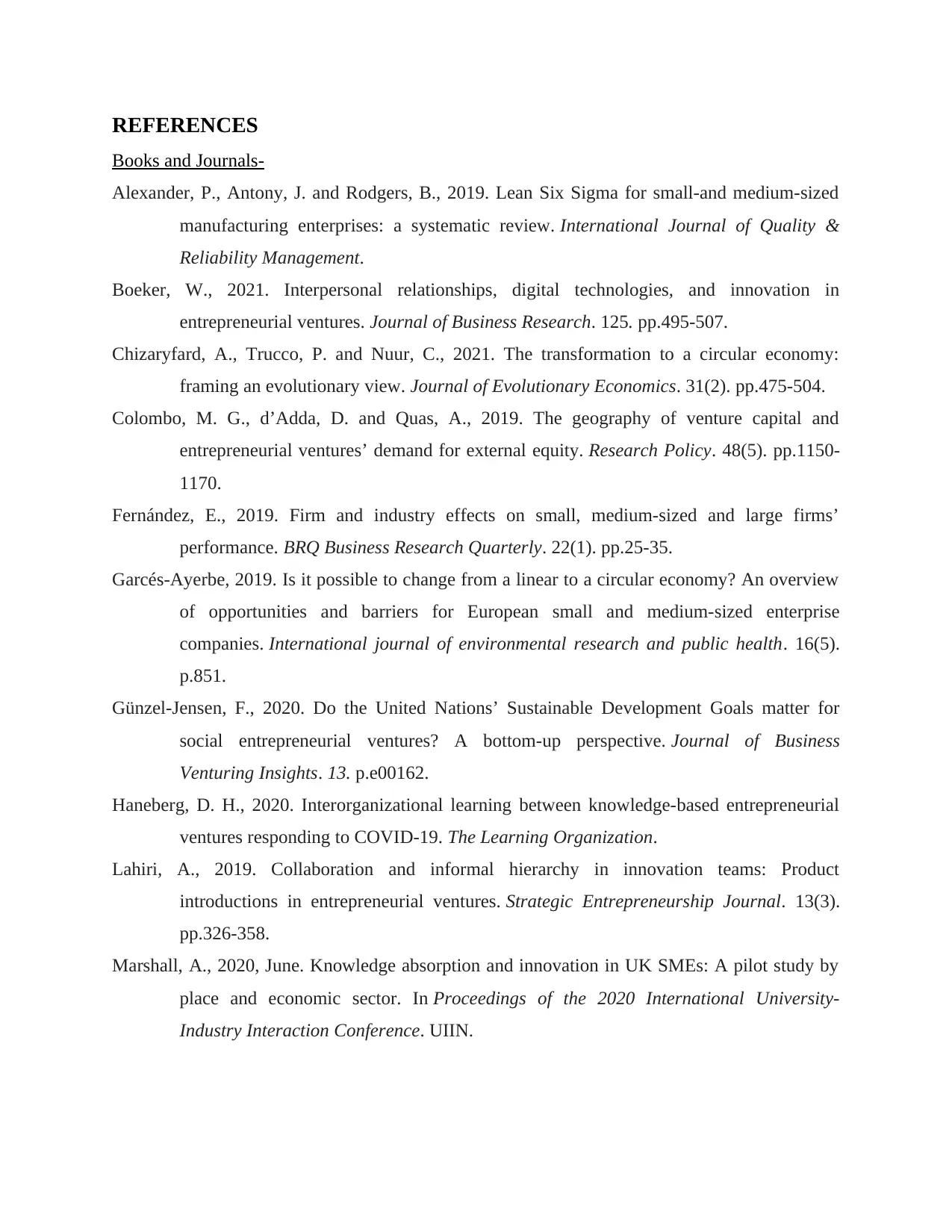
REFERENCES
Books and Journals-
Alexander, P., Antony, J. and Rodgers, B., 2019. Lean Six Sigma for small-and medium-sized
manufacturing enterprises: a systematic review. International Journal of Quality &
Reliability Management.
Boeker, W., 2021. Interpersonal relationships, digital technologies, and innovation in
entrepreneurial ventures. Journal of Business Research. 125. pp.495-507.
Chizaryfard, A., Trucco, P. and Nuur, C., 2021. The transformation to a circular economy:
framing an evolutionary view. Journal of Evolutionary Economics. 31(2). pp.475-504.
Colombo, M. G., d’Adda, D. and Quas, A., 2019. The geography of venture capital and
entrepreneurial ventures’ demand for external equity. Research Policy. 48(5). pp.1150-
1170.
Fernández, E., 2019. Firm and industry effects on small, medium-sized and large firms’
performance. BRQ Business Research Quarterly. 22(1). pp.25-35.
Garcés-Ayerbe, 2019. Is it possible to change from a linear to a circular economy? An overview
of opportunities and barriers for European small and medium-sized enterprise
companies. International journal of environmental research and public health. 16(5).
p.851.
Günzel-Jensen, F., 2020. Do the United Nations’ Sustainable Development Goals matter for
social entrepreneurial ventures? A bottom-up perspective. Journal of Business
Venturing Insights. 13. p.e00162.
Haneberg, D. H., 2020. Interorganizational learning between knowledge-based entrepreneurial
ventures responding to COVID-19. The Learning Organization.
Lahiri, A., 2019. Collaboration and informal hierarchy in innovation teams: Product
introductions in entrepreneurial ventures. Strategic Entrepreneurship Journal. 13(3).
pp.326-358.
Marshall, A., 2020, June. Knowledge absorption and innovation in UK SMEs: A pilot study by
place and economic sector. In Proceedings of the 2020 International University-
Industry Interaction Conference. UIIN.
Books and Journals-
Alexander, P., Antony, J. and Rodgers, B., 2019. Lean Six Sigma for small-and medium-sized
manufacturing enterprises: a systematic review. International Journal of Quality &
Reliability Management.
Boeker, W., 2021. Interpersonal relationships, digital technologies, and innovation in
entrepreneurial ventures. Journal of Business Research. 125. pp.495-507.
Chizaryfard, A., Trucco, P. and Nuur, C., 2021. The transformation to a circular economy:
framing an evolutionary view. Journal of Evolutionary Economics. 31(2). pp.475-504.
Colombo, M. G., d’Adda, D. and Quas, A., 2019. The geography of venture capital and
entrepreneurial ventures’ demand for external equity. Research Policy. 48(5). pp.1150-
1170.
Fernández, E., 2019. Firm and industry effects on small, medium-sized and large firms’
performance. BRQ Business Research Quarterly. 22(1). pp.25-35.
Garcés-Ayerbe, 2019. Is it possible to change from a linear to a circular economy? An overview
of opportunities and barriers for European small and medium-sized enterprise
companies. International journal of environmental research and public health. 16(5).
p.851.
Günzel-Jensen, F., 2020. Do the United Nations’ Sustainable Development Goals matter for
social entrepreneurial ventures? A bottom-up perspective. Journal of Business
Venturing Insights. 13. p.e00162.
Haneberg, D. H., 2020. Interorganizational learning between knowledge-based entrepreneurial
ventures responding to COVID-19. The Learning Organization.
Lahiri, A., 2019. Collaboration and informal hierarchy in innovation teams: Product
introductions in entrepreneurial ventures. Strategic Entrepreneurship Journal. 13(3).
pp.326-358.
Marshall, A., 2020, June. Knowledge absorption and innovation in UK SMEs: A pilot study by
place and economic sector. In Proceedings of the 2020 International University-
Industry Interaction Conference. UIIN.
Paraphrase This Document
Need a fresh take? Get an instant paraphrase of this document with our AI Paraphraser
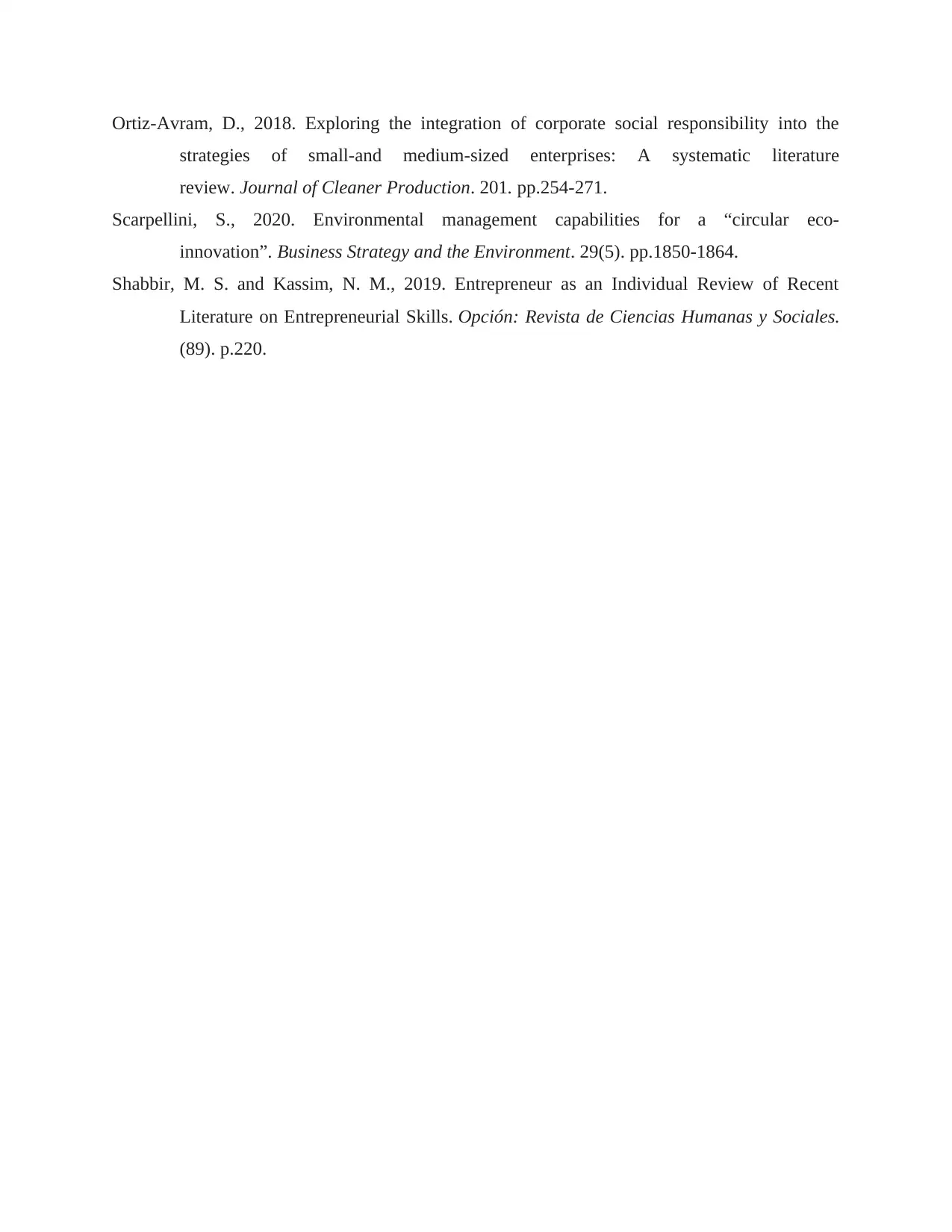
Ortiz-Avram, D., 2018. Exploring the integration of corporate social responsibility into the
strategies of small-and medium-sized enterprises: A systematic literature
review. Journal of Cleaner Production. 201. pp.254-271.
Scarpellini, S., 2020. Environmental management capabilities for a “circular eco‐
innovation”. Business Strategy and the Environment. 29(5). pp.1850-1864.
Shabbir, M. S. and Kassim, N. M., 2019. Entrepreneur as an Individual Review of Recent
Literature on Entrepreneurial Skills. Opción: Revista de Ciencias Humanas y Sociales.
(89). p.220.
strategies of small-and medium-sized enterprises: A systematic literature
review. Journal of Cleaner Production. 201. pp.254-271.
Scarpellini, S., 2020. Environmental management capabilities for a “circular eco‐
innovation”. Business Strategy and the Environment. 29(5). pp.1850-1864.
Shabbir, M. S. and Kassim, N. M., 2019. Entrepreneur as an Individual Review of Recent
Literature on Entrepreneurial Skills. Opción: Revista de Ciencias Humanas y Sociales.
(89). p.220.

⊘ This is a preview!⊘
Do you want full access?
Subscribe today to unlock all pages.

Trusted by 1+ million students worldwide
1 out of 12
Related Documents
Your All-in-One AI-Powered Toolkit for Academic Success.
+13062052269
info@desklib.com
Available 24*7 on WhatsApp / Email
![[object Object]](/_next/static/media/star-bottom.7253800d.svg)
Unlock your academic potential
© 2024 | Zucol Services PVT LTD | All rights reserved.





